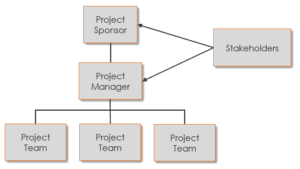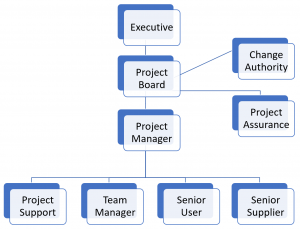
Every project has distinct roles that must be fulfilled in order to function properly and provide the products or services it was intended to provide.
As a minimum, it needs a project manager and a project team who does the work, although those roles could be fulfilled by the same person. It also needs a connection to the larger corporate body who ensures funding is available and accepts the project’s deliverables – called a project sponsor. But the larger the project, the more roles there are.
The following ten project roles exist in every project. In theory, all of the roles are present in all projects although one person could fulfill multiple roles.
- Project Manager
- Project Team
- Project Sponsor
- Executive
- End User
- External Stakeholders
- Project Assurance
- Project Support
- Project Management Office (PMO)
- Change Authority
Project Manager

The project manager is the highest level of authority within the project. They use project management tools and methodologies to ensure the success of the project.
The project manager reports to the project sponsor, who manages project funding and accepts the project’s deliverables.
The project team, who carry out the technical work, report to the project manager.
Project success is defined as satisfying all critical success factors for the project, which should normally be identified at the beginning of the project. For example:
- It finishes on time
- It stays within budget
- Stakeholders are satisfied
- Any other factor which affects project success is satisfied
A project manager’s antithesis is a functional manager (department head) who oversees a division that produces an ongoing or operational product or service. Since a project is defined as an undertaking with a distinct beginning and end producing a unique result, the project manager is overseeing a temporary business initiative that exists beside the normal operations of the business. However, some businesses are project-oriented in nature, where the business performs only projects (construction firms, etc.) in which case the project managers have no equivalent department managers.
The project manager’s role includes a strong element of leadership, including the development of a vision for the project and motivation of the project team to accomplish the vision.
Project Team
 The project team carries out the project’s technical work. They produce the deliverables that the project was commissioned to produce. They perform the project tasks throughout the execution phase.
The project team carries out the project’s technical work. They produce the deliverables that the project was commissioned to produce. They perform the project tasks throughout the execution phase.
The project team is responsible for producing the project’s deliverables to the quality standards identified within the project management plan. The deliverables can be:
- A product, for example a research report.
- Many products, for example a number of promotional materials.
- A service, for example a training course.
Project Sponsor
 The project sponsor is one level above the project manager. They ensure the project’s funding is in place and accept the project’s deliverables.
The project sponsor is one level above the project manager. They ensure the project’s funding is in place and accept the project’s deliverables.
Often the project sponsor is the person who championed the project and was instrumental in its creation. Although a separate project manager is assigned, the sponsor continues in the role of liaison between the project and its parent organization.
In many industries, the project sponsor belongs to the project’s owner organization and the project manager to a consulting firm, for example for a freeway construction project the sponsor works for the State Department of Transportation and the project manager is at an engineering firm.
Executive
 The executive is above the project. Their interaction with the project is usually through the project sponsor, but we include it here because it is an important role in the organizational structure.
The executive is above the project. Their interaction with the project is usually through the project sponsor, but we include it here because it is an important role in the organizational structure.
The executive has information needs from the project. The project manager must usually consider the executive when producing status updates and project financial and expenditure reports. If the project manager produces earned value reports or project control reports, the content and format of those reports must consider the executive.
The executive, in turn, makes decisions (particularly financial ones) which may affect the project.
End User
 Sometimes there is a different end user than the organization who initiates and pays for the project.
Sometimes there is a different end user than the organization who initiates and pays for the project.
For example, software projects are initiated by an owner (the software firm), but the end users are the customers who pay for the software. Hence, if the project is not keenly aware of the end user’s needs and design/build the project accordingly it is not likely to be a success.
Of course, the project needs to satisfy both stakeholders, the end user and the executive/sponsor. Sometimes this requires convincing the executive/sponsor of why a certain feature is better.
External Stakeholders
 Many projects have external stakeholders that have power or influence over the project.
Many projects have external stakeholders that have power or influence over the project.
For example, surrounding landowners, affected businesses, or even the general public (for a road construction project) have a say in how the project is executed, including budget and schedule implications.
Sometimes these stakeholders need to be moved from an opposed or indifferent viewpoint to a supporting one. These stakeholders require a high degree of project management effort. Their needs and wants should be analyzed to ensure that the project management team knows what the underlying motivations are, and how those needs will be satisfied.
Project Assurance

In the PRINCE2 methodology, a project assurance role is the responsibility of the project board. This role involves monitoring the project’s quality activities to ensure the quality standards are being achieved. It also involves providing advice to the project manager regarding decisions involving the specifications or function of the product or service.
The project assurance role is above the project manager and does not directly manage project functions.
Project Support
Unlike project assurance, the project support role occurs at the project management level. It assists the project manager with administrative functions, project management and project control. It can also provide specialist functions like risk analysis or planning.
Project Management Office (PMO)
Many organizations now have a project management office (PMO) which provides the role of project support. The PMO’s authority can range from providing advice to complete management of project functions.
Change Authority
The most controversial part of most projects is when they change.
Something occurs that requires a change in the budget, schedule, project team, quality, risk, or any other aspect in mid-project. Often the change is accompanied with a significant amount of grief. The stakeholders must agree on the project change, and the project management plan must be changed and approved by all stakeholders.
The “change authority” is often the group consisting of the project manager, project sponsor, and executive, who together have the authority to define and approve the change. But the exact makeup of this group varies by project and organization.
Many projects have stalled or even failed because the change authority was not well defined and a project change became mired in paralysis. Hence, the change authority is an important component of the project organizational structure.






